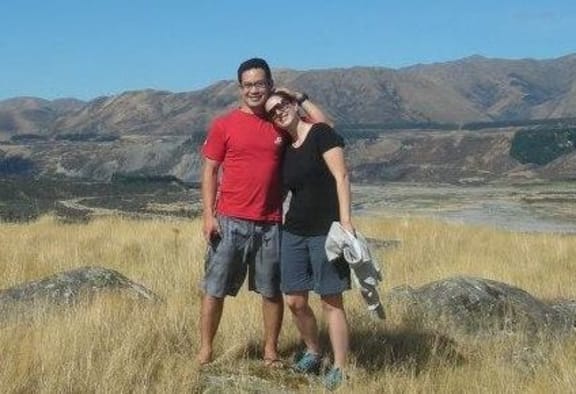Search teams have retrieved the bodies of two climbers who died after being trapped on Mt Taranaki for two nights.
An Air Force helicopter flew the bodies of Hiroki Ogawa and Nicole Sutton to New Plymouth on Tuesday morning.
A day earlier, rescuers reached the snow cave the couple had dug to try to shelter from a blizzard. They found Ms Sutton alive and gave her medical assistance for some hours but she died in their arms.

Hiroki Ogawa and Nicole Sutton. Photo: NZ POLICE
Father Keith Sutton told reporters on Monday the 29-year-old had sent a text message on Sunday evening saying she did not think she would survive the night.
"I faced the morning and the reality that our daughter wasn't with us only to find that she was - and then she wasn't. Anybody who's a parent will know what that's like."
Mr Sutton said the couple met about two years ago and both had a love of the outdoors. His daughter was relatively new to alpine climbing, but had done courses and learned rapidly.
He said he was proud of how she had sent detailed information and directions to rescuers by text. "The texts she's provided have been absolutely exemplary in terms of fact and correct positioning and we're very proud of her ability."
"They were doing what they loved and they made the choices and we're just so pleased that they were doing what they loved when they came this end," he said
The pair were part of an Auckland Alpine Club climbing group of eight who reached the summit of the mountain late on Saturday. Four of the group ran into trouble during the descent and two made it back down on Sunday.
Ms Sutton and Mr Ogawa, from Japan, tried to shelter in a snow cave for a second night as overnight temperatures plummeted to minus 17 degrees Celsius
Rescuers battled treacherous conditions to reach them early on Monday and found that Mr Ogawa had died. Police say the 31-year-old's family will arrive in New Zealand from Japan on Wednesday.
Meanwhile, two climbers who were with a couple have now left Taranaki Base Hospital after recovering from mild hypothermia, cuts and bruising. New Zealand Alpine Club spokesperson Sam Newton says the 65-year-old man and 38-year-old woman are on their way back to Auckland to be reunited with family and recover from their ordeal.
Treacherous weather
Rescue teams tried for three days to reach the couple, including night-time attempts, but were repeatedly beaten back by the atrocious weather.
Mike Johns from Taranaki Alpine Cliff Rescue said conditions were reasonable when the pair left on Saturday, but changed quickly and caught them out. He said digging a snow cave was still the best thing the couple could have done to protect themselves from the weather.
New Zealand Alpine Club general manager Sam Newton said conditions can appear deceptively mild when ascending Mt Taranaki from the north, or on the eastern route the couple had taken.
"You can be climbing in sunshine and calm wind only to approach the top and realise that there's a screaming westerly or a screaming southerly approaching and at that point you have to descend very quickly, which is what these climbers endeavoured to do."
Other climbing specialists say part of the problem may have been that the climbers got to the summit late in the day. Rob Needs, owner of Kiwi Outdoors Centre and a Land Search and Rescue volunteer, said it is unclear why the couple did not descend.
"Why the group has separated is yet to be discovered and why they chose to try and sit out the weather when realistically the descent from where they were to relative shelter is maybe two hours worth of descending."
Taranaki mountaineering guide Ian McAlpine said climbing courses elsewhere don't fully prepare alpine club members for the conditions on Mt Taranaki. Mr McAlpine runs Mt Taranaki Guided Tours and said often alpine club members will do courses on Mt Ruapehu, which is not as long or steep.
"Last year we didn't have any club people coming, so we didn't have any accidents. But, having said that, local people can have accidents just as easy. But I think that what happens is that the local people are a little bit more aware of weather change."
Mr McAlpine said he was leading a group on Mt Taranaki on Saturday, the day the party became stranded, but turned back when the wind became uncomfortably strong.
Eighty-three people have died on Mt Taranaki since 1891.

